The Doctor says farewell to two trusted companions, but first they battle Desert Squids, Frankenstein's Monster, Dracula and Spherical Daleks.
The Doctor, Vicki and Steve arrive in England in 1066 and are pitted against Saxon logic, brutal Vikings and a fellow time traveller.
Podcast: Play in new window | Embed
It transpires that Steven (of ‘The Chase’ fame) stowed away aboard the TARDIS, so at least The Doctor won’t need to deal with Vicki on his own. The Stevemeister refuses to believe that they can travel through both space and time, whereupon Doc does what he claimed incapable of doing for Barbara and Ian, namely, take them to England. Alas, it’s the year 1066 and the Battle of Hastings is just around the corner, as are some weirdly trusting Saxons and some vicious and ill-coiffed Vikings.
That’s not all, though. Also present is a Meddling Monk, who goes by ‘Father’, has an electric toaster and isn’t really human. In fact, he’s a fellow Timelord. Which is pretty awesome, since this is the first time we encounter anyone from Gallifrey who is neither The Doctor nor Susan.
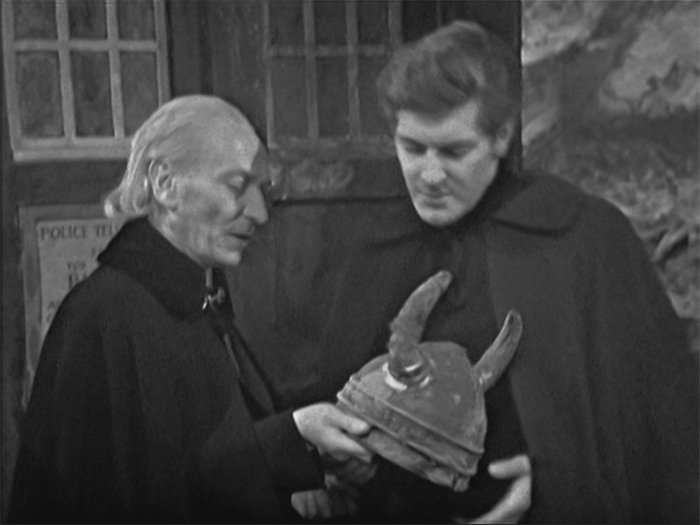

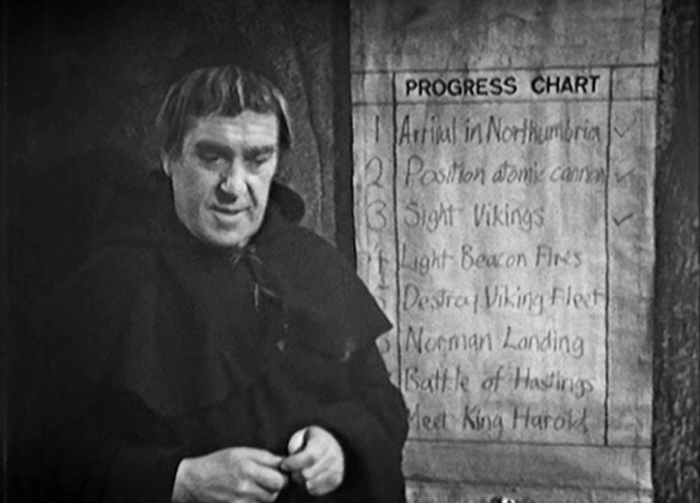

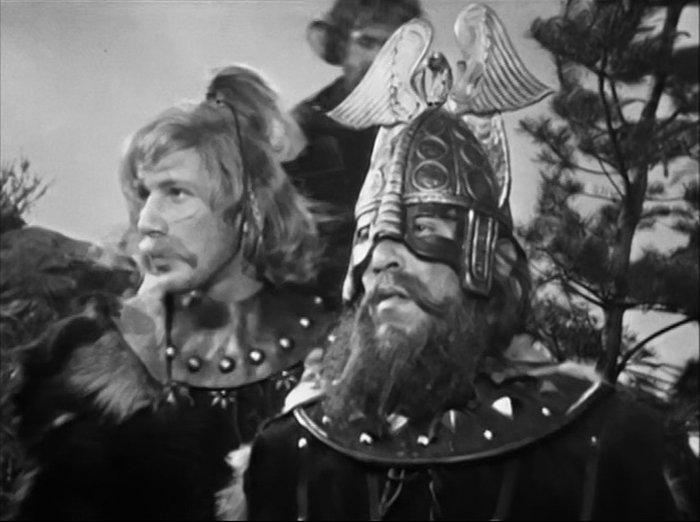



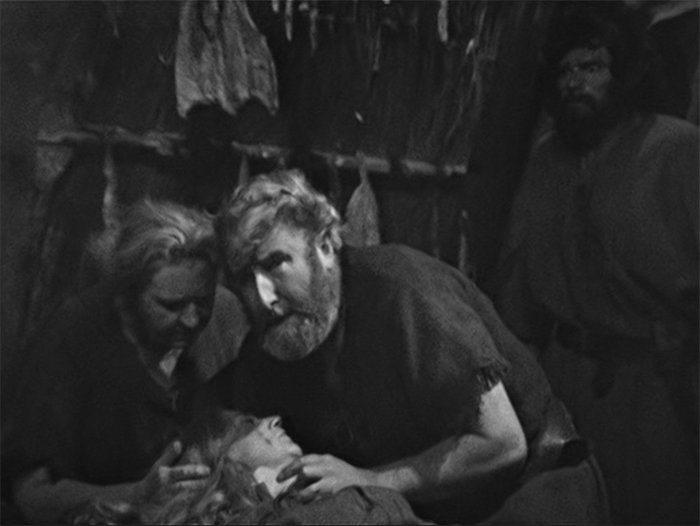

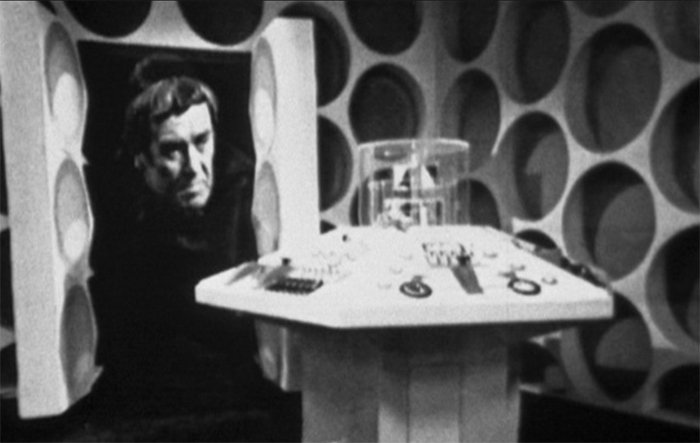

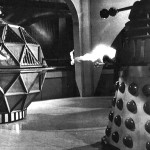
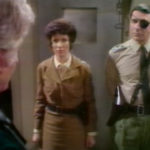








Incredibly mini-review for The Time Meddler.
Quite possibly the most giggles from the 1st Doctor in a single serial! For a Doctor that most people find a grump I recommend this serial as i) It will ingrain the sound of Hartnell’s giggles into your mind for an eternity, completely eliminating any thought of him as a big old grump. And ii) It’s one of, if not the best, Hartnell serial.
The first renegade Time Lord (although we don’t know the race name yet), played brilliantly by Butterworth, the first time we see another TARDIS, the Doc actually being rather heroic for a change, and in such an upbeat manner; seriously, what more do you need!?
P.S Ponken take note, the Monk will be important for you further down the line…cryptic warning over.
Forgot to add my rating, which was 4.2.
-Buccaneer
Before I start, let me just say that I enjoyed this serial. But not as much as the Chase or Space Museum. Don’t kill me, please. Anyways, let’s begin. This serial starts out in 12th century England, where Vikings are about to attack. In the first episode, it almost seems like we are about to watch another historical. Then the “Doc….TOR!”, finds a phonograph and Steven finds a watch. Anyways, the Doctor travels to a small town near a monastery, where he meets the locals. They tell him about the monastery, which he then decides to explore. Here he learns that there is only one monk, and the singing came from a phonograph. And he is promptly captured.
Meanwhile, Steven offers Vicki blackberries for breakfast. Then eats all of them. Vicki gets none. Steven, you pig. Seriously, you steal Ian’s role and Vicki’s blackberries.
They decide to follow in the Doctor’s footsteps, and ask the Monk if they’ve seen him or not. He says no, and Steven pulls a Keys of Marinus on the Monk. He has the Monk recall the description of the Doctor, even though Steven never described him. Then Vicki thinks that the Monk tricked them into thinking they tricked him. What?! Vicki, go get your brain checked. I’m concerned. They go back down to the TARDIS, where the tide has come in. Cue the Davis Principle.
They go back up, and they get into the Doctor’s cell. He’s not there. Vikings begin to attack. Vicki and Steven find a passageway. Stuff happens. The Doctor takes the Monk hostage. Steven and Vicki find the Monk’s TARDIS (cue the Daleks: TARDIS! TARDIS! TARDIS! TARDIS!). More stuff happens, and the whole crew plus the Monk are in the new TARDIS. The Monk unveils his plan to screw with time and ties up everyone. They escape, the Doctor does timey-wimey stuff to make the Monk’s TARDIS bigger on the inside. The end. I give this serial a 4.0 out of 5. It started out so slowly, and wasn’t incredibly interesting at first. Then around episode 3, it became awesome. The Monk mystery was interesting. Finally, we get super creepy glowing faces against stars. I marked up for that.
Doctor Who Season 2 Episode 9: The Time Meddler Review in 500 words or less.
Having sent Ian and Barbara on their way home, The Doctor and Vicki discover Steven, delirious but alive, who has hitched a ride from Mechanus (10 pts to Ponken). The TARDIS materializes on a beach in Northumbria, and after splitting off along different paths, The Doctor, Vicki and Steven find themselves embroiled in the lives of a small village of Saxons, and a somewhat alcoholic and inept Viking scout party, all the while unravelling the mysterious machinations of The Meddling Monk.
From start to finish, Dennis Spooners wonderfully crafted story, coupled with steady direction by Douglas Camfield, is tight and engaging. Each episode is a new and enjoyable experience. There seemed to be very little filler, and even the slightly sillier bits (Monks Diary of Dirty Deeds, Obvious Checklist is obvious, BAD FIGHT CHOREOGRAPHY), didn’t really detract from the general flow of the story. From tip to tails, I was hooked.
The development of The Doctor, specifically, is epic. Hartnells performance is very much a step forward in the evolution of the character. There is a renewed strength and sharper mind at work in The Doctor of this serial. It’s like we finally see, in my opinion, the actual beginning of The Doctor as an iconic, resourceful, brilliant hero. He utilizes his intellelect and cunning to outsmart the Monk, and stays just on the periphery of history, allowing it to take its own course. And miraculously, while adjusting to the headstrong and somewhat obtuse character of Steven, i had a hard time finding any fault with Vicky.
The big win here is Peter Butterworth. The Monk is the first member of The Doctor’s race (so far, unamed) we have met, aside from Susan. What a character!!?? Out of all of Who, The Monk remains one of the most intriguing and interesting counter point characters to The Doctor. We meet him again (spoilers), but of all the Time Lords, The Monk is sorely underused.
I need to point out the short-lived yet palpable pre and post tension of the blatant rape of Edith (Hur from An Unearthly Child). It was staggering to watch. I cant remember seeing something quite so raw in a show of the period before.
Additionally, this serial is the first of its kind to blend the two elements of actual history and science fiction, without distorting either. The Monks plan to harness his knowledge of history and subtlely twist it to his own ideal purpose is not inherently evil, which makes the scenes between The Doctor and The Monk all the more intriguing.
The Time Meddler is by far one of my top ten Who serials of all time, if not top five. It is creative, imaginative and moves with an easy grace from opening shot to closing sequence. It earns a very special 4.7, taking away only for the weaker subplot between the villagers and invading Vikings.
In my opinion, one of the weaknesses of a lot of the older Doctor Who stories, at least compared to modern entertainment in general and modern Doctor Who in particular, is pacing. Because the stories are aired over usually four-to-six weekly serials, the pacing is generally much slower. As a result, some serials can be harder to get through than others in the middle sections.
That said, “The Time Meddler” is better than most about this. While some scenes may drag on a tiny bit, nearly every scene feels like it contributes to the story as a whole and lack some of the padding seen in some serials such as the extended haunted house sequence in “The Chase.”
The Doctor is in good form. Twice escaping capture on his own, in one case before Steven and Vicki arrive to rescue him and stopping the Monk’s meddling in a particularly amusing fashion.
Despite how past Who Back When reviews regard her, I don’t have a particular issue with Vicki. I haven’t seen many serials with her, though it did feel odd having her be the experienced companion next to the initially skeptical Steven. I wonder how it must’ve been for viewers in the 60s, watching this entirely new pair of time travelers now that all three original companions were gone.
The Monk was probably the best part for me. I got a kick out of the anachronism of watching him use an electric toaster and stove to make him and the Doctor breakfast. Also his growing frustration as he kept getting visitors (“It’s as if a man can’t call a monastery his own, anymore”) was good for a chuckle too. It was also interesting to see two Time Lords interact before we even had the concept of Time Lords in the story. All that’s said is they’re from the same place.
I’m not entirely certain what to call it for a score. The pacing was slow in some areas, which I tend to find normal for the older serials. There were some issues with the viking characters. They seemed especially dim (they were told to go scout carefully then run up and attack the first person they find, causing them no end of trouble) and unless I missed something we never saw anything of the ship that dropped them off that they were supposed to be reporting to after they got left.
At first, I wasn’t going to mess around with the decimals and call it a solid four out of five. On second thought, I’m going to give it a 4.5. It was a solid story, no glaring flaws that I could see (but then I tend to be forgiving UNLESS the flaws are very glaring). I’m sure there are good and bad points I missed, but generally unless they interrupt my ability to actually watch the story at the time, I’m not prone to worrying about them.
The Time Meddler is our first psuedo-historical. I found it fun and engaging with the Doctor running into another Time Lord, rapey Vikings, and the addition of new companion Steven. This being the first story without Ian & Barbra, we are left with annoying & useless Vicki. The Doctor, so desperate for company, wants to make sure she does not want to leave him. Doctor, you can do better. Then Steven stumbles out, teddy bear in hand. I hope this is the last of the stuffed animal’s appearances. So far my initial reactions to Steven: He’s no Ian. Less sciency and not the greatest fighter… However, I enjoyed Steven and Vicki’s paring during most of the story. Although Steven doesn’t listen to Vicki at the beginning (and why would anyone), somewhere amongst the bickering they manage to develop a reas! onably balanced relationship ( the part where they both say “Follow me” and Steven, though grumbling, caves in and follows Vicki).
We meet the Monk, a fellow time traveler who tampers with time, meddling with history in an attempt to improve the future from his own perspective. The monk is able to control of both the landings of his TARDIS and its camouflage unit (now called chameleon circuit), which the Doctor hasn’t been able to do. What I enjoyed most about this story was the interplay between Harnell and Peter Butterworth’s Monk. The monk happily travels through time, changing things as he goes, to try and improve things. We find he’s already changed history as ‘we’ know it anyway, by helping in the construction on Stonehenge using advanced anti-gravity technology. Then we have the weaker subplot of the invading Vikings, who are swilling mead, fighting Saxons and apparently rape Edith (who you may recognize as cave woman Hur from An Unearthly Child). It wouldn’t be Doctor Who without some implied rapeyness.
Stray observations:
Does the Doctor just keep hundreds of different capes in the wardrobe, because Steven looked like Luke Skywalker in Return of the Jedi and Vicki looked like a hobbit.
The Doctor noticing the record scratching, his escape from the cell (by the way, why would a monastery have cells) and his threatening the monk with a stick.. Brilliant
And I freaking love the Doctor’s line “No more monkery”
And isn’t the cliffhanger for Episode 3 when a shocked Vicki and Steven discover that the Monk’s got a TARDIS still jaw dropping, cant imagine how the audience in 1965 reacted to that.
Favorite flub of the episode : “I’m not a mountain goat, and I prefer walking to any day. And I hate climbing!”
The Monk’s checklist, written on a whiteboard in marker, where his plan is broken down step-by-step. Nice touch.
Overall, It was good story with at least a few memorable characters and some interesting back story on the Doctor and where his stance on “non-interference” stems from. Steven and Vicki make a good duo and I cant wait to see The Monk again in The Daleks Masterplan. My rating it a 3.2.
The really important part of this is the list of changes this serial brings.
Please read as much as possible, you guys will like knowing a lot of this stuff and many listeners will too probably.
This was a big finale. But this is not just the Season 2 finale. Nor is it Ian and Barbara’s finale; that was last week. Not even a finale the viewers would notice. This is one of the most important finales in all of Doctor Who, the finale of Verity Lambert, the first producer (in modern terms show runner) of Doctor Who.
This incredibly mysterious and inventive serial not only created the pseudo-historical (occasionally used in Classic Who, but absolutely essential to New Who), it also brought many changes to series as a whole and marked a major turning point with Verity Lambert giving control to John Wiles. This story may seem slow and filler heavy to some new viewers but during the more dull scenes with a lot of historical dialogue, the viewers at home would have been freaking out. This must’ve been the biggest shock to their system yet. I give this story a 5 out of 5 for what must’ve shocked the 60s audience; a truly mysterious villain, an absolutely unique plot (for the time), some great cliffhangers, and the overall chemistry of the actors. The idea was also so good it was worth copying many, many times.
List of changes (Minimal spoilers and pretty important to consider)
-Producer, Verity Lambert to John Wiles following this story
-Script editor, Dennis Spooner to Donald Tosh starting with this story
-Much more missing episodes (sadly only 5 out of the next 25 serials/3 Seasons are complete)
-William Hartnell becomes much more crotchety as his health begins to deteriorate, he is much more unhappy in general on set
-Due to Hartnell’s health Steven is written as a possible action stand-in for the doctor, doing most of the work and fighting while the doctor stays back
-Due to Hartnell’s attitude toward attempts at being written out John Wiles (the new producer) only stays 6 months, fearing a heart attack from so much arguing and infighting with Hartnell
-Companions, this is Vicky’s last fulling existing story and from this point on the Tardis doors will open and close to a lot more people
Also, between season 2 and 3 was the release of the first Peter Cushing movie, Dr. Who and the Daleks, so you guys should really do it next chronologically.
Too long; didn’t read = this is that middle part of adventure in space and time where it starts to get really sad
Hey Al!
Really sorry for not including your awesome Mini here until now. It somehow slipped through the cracks in time and only just popped up on our space/time visualiser. Our most sincere apologies, dude.
PS: Great Trivia! Thanks very much :)
The Monk is a great character here (as opposed to the Master Plan, which I’ll discuss then). Secret passages, abandoned monasteries made to seem inhabited, Vikings, bonks on the head, a lovely little town with a sweet and honest woman, villager torch mobs, what’s not to like here? That’s the best way to describe this story. Unfortunately the other half of that is to say that many of the interesting things are not explored to their full potential. The Vikings are really threatening at first, but end up being somewhat bumbling and slapstick, without a plan. The special gun that is a major part of the story is never fired (not to mention that it looks very WWII for a laser weapon), the village consists of one hut and a clearing. The merging of technology from different times is wasted on a dropped wrist watch. How cool would it have been if the villagers or Vikings found out about the advanced tech and tried to take it for their own? The Vikings could have fought over the wrist watch with the dr pointing out that such a trivial thing could advance them prematurely and change everything. The monk uses a record player? Really? How about at least a tape machine that doesn’t skip. He’s got all of time and space to choose a media player and he uses a record player. A Zune would have worked better. This one mistake is what points the dr to the monastery, ultimately causing the Monk’s downfall. Do we even get to see any ships arriving? I forget.
Conversely, the monk is a wonderfully realized (except for the task list, that was cheesy). The banter between he and the doctor was great with layers of subtext even when they weren’t actually talking. The monk should have been in more scenes with the main chars. The acting was good, with some exceptional moments here and there. The villager woman was amazing. The dr’s cleverness shines here.
I like this episode, but it could have been better. It had a lot going for it, but some things were missed opportunities that could have drove the overall theme of the story to new heights. It’s visually also a little too dark, but perhaps that’s just the version I have. 2.8
The Doctor, Vicki and Steven land in 1066 England, just prior to the Norman Invasion and the Battle of Hastings. Steven doesn’t believe in time travel, and Vicki is having a hard time convincing him, especially when they start to discover all sorts of anomalies: wrist watches, toasters, gramophone records and atomic cannons…
It turns out that the Doctor is not the only being in the universe with a TARDIS. The Monk up at the old monastery on the cliff has both a TARDIS and a masterplan – though what exactly that is, and how it benefits anybody, never becomes clear. It’s sufficient to know that he’s a bad guy and must be dealt with.
THE MAJESTY
Steven’s disbelief in time-travel chimes perfectly with the content of the story: this is the first pseudo-historical in Doctor Who, and is really rather charming.
The titular Monk is a wonderful character. Both in his interplay with the Doctor, where he is seen to be equal to him in cunning banter, and in his many scenes where he takes the lead, he is show-stealingly awesome. Acted by Peter Butterworth, from the Carry On… films, the Monk is comical, charismatic, entertaining and a brilliant addition to the show. It’s a shame that he only makes one other appearance, because he would have been a wonderful recurring character.
I also am impressed with this story for dealing with a subject matter – rape – that would be considered far too dark for the show to tackle now. It also deals with it in a very careful, restrained way, making it suitable even for children. It’s well-balanced, and in particular, the Doctor’s complete oblivion to the fact that it has occurred provides a surprisingly layered scene between himself and Edith. On the surface, the Doctor is getting a snack and having a chat. Underneath, we are hoping that he will realise that something terrible has happened… and he never does. There’s more than a hint of truth in that.
THE MISERY
The low points are just some general disappointments: Vicki is annoying, as usual. The atomic cannon is rather pathetic, being little bigger than a packet of Pringles on wheels. The idea that nobody realises the Monk is an imposter is rather implausible. And after the battles of “The Crusade”, “The Aztecs” and even “100,000BC”, the fight sequences here are very lame. Typically they will involve a lot of shouting and very little movement of weapons, even to the extent of some people falling to the ground before a sword has even been swung.
MAGICAL MOMENTS
– The first sight of the Monk, looking down on the TARDIS, with something almost like recognition on his face, tells us that this is something we haven’t seen before.
– The Doctor, explaining the TARDIS to Steven, “That is the dematerialisation control, and that over yonder is the horizontal hold. Up there is the scanner, those are the doors, that is a chair with a panda on it. Sheer poetry, dear boy!”
– Having found a horned Viking helmet, the Doctor is irritated by Steven’s continued disbelief in time travel. “What do you think this is then? A space helmet for a cow?”
– The Doctor, faced with a cliff. “I’m not a mountain goat… and I prefer walking to any day… and I hate climbing”. Ah the line started out so well….
– At the climax of episode one, the Doctor discovers the source of the monks chanting: a gramophone record. And immediately he is locked in a cell with the monk laughing uproariously – brilliant episode end!
– The Monk hands in breakfast to the Doctor in his cell. The Doctor throws some liquid over the Monk… Was that a chamberpot? That’ll teach him!
– The Monk cures a man with paracetamol. I like this both as another fun incidence of modern life in history and also as a nuance to the Monk’s character. Most other villains would just have killed the man and hidden his body. But the Monk is not really a bad guy – just an irresponsible one.
The Monk’s progress chart surely has a ‘page 2’ to it. Otherwise the entire plan concludes with “8 – Meet King Harold”, which frankly is a bit anti-climactic.
– “Remember”, says the Doctor, “No more monkery!”
– The Monk and the Doctor, in separate scenes, despatch a Viking in exactly the same way: hitting them on the head from behind with a rather small piece of wood. It’s another indication of just how similar the two of them are.
– The climax of episode 3 has Steven and Vicki walking into the monk’s TARDIS. It’s familiar, but different – with it’s black floor and smaller space. And it’s also a pivotal moment in Dr. Who.
– I have always loved the Monk’s little achievement, recorded in his diary. “Put £200 in a London bank in 1968. Nipped forward two hundred years and collected a fortune in compound interest.”
– When the Saxons raid the monastery, the Monk grabs his robes and with his knobbly knees on display, scuttles away with a remarkable turn of speed.
– The Monk looks in on his dollhouse TARDIS. His head barely fits through the door. Wonderful image.
IN SUMMARY
This is a seminal story in the history of Dr Who. We meet another Time Lord for the first time (though they are not yet called this). The Doctor is no longer unique, neither is the TARDIS. Insofar as there is an ‘overall’ story in the Doctor Who series, running from 1963 to the present, then this story represents one of the major milestones.
Not only is this story so crucial for the series as a whole, but it is also highly enjoyable as a story in it’s own right – largely down to the presence of the Monk. Steven has a good start as a companion, but Vicki is poor, and with the exception of Edith, the whole assortment of Saxons and Vikings are instantly forgettable. But Peter Butterworth more than makes up for the failures of the rest of the cast by radiating as much charisma as the Doctor himself.
OVERALL: 4.3
This is a belter of a story. Whilst it does sag somewhat in the middle, there is so much to love about it. Being a four-parter and fully intact, its zippier than most of this era.
Hartnell is as his happiest, giggling his way through the adventure, even more noticeably in episodes three and four. Must have been on a high from his week off. It has some cracking lines: Monkery! Space helmet for a cow! Panda on a chair (sheer poetry)!
It’s an ok debut for Steven and his chemistry with Vicky is strong. The Monk is excellent and has some great interplay with the Doc. He comes across as misguided but don’t forget he wanted to slaughter a bunch of norsemen. Causing chaos for no other reason than it’s a bit of a lark is a nice change from wanting to dominate the universe rule the world. Something fellow Time Lord The Master would later revel in. The monk has to be the character most overdue a return in nu-who, so many possibilities!
Whilst it’s all over the place in terms of plot, that doesn’t matter, just sit back and enjoy the marvellous moments: The anachronisms, the shock of the Monk’s Tardis, meeting another time lord and the BEST thing of all, the progress chart for his master plan: Sight Vikings. Tick.
A seminal story that lays the foundation for future Who lore. Very enjoyable.
3.9/5
From start to finish, The Time Meddler is almost perfect. Right at the beginning, the narrative gives us an odd monk with a strangely familiar reaction to seeing the TARDIS materialize on a beach in 1066. Throughout the first episode, we get some great hints that this monk may be more than he seems, culminating in a wonderful cliffhanger, with the monk cackling in the face of a captured Doctor. Across the entire serial, Peter Butterworth steals the show, giving us a likeable antagonist despite his maleficent intentions. His final monologue and his wonderful expressiveness there seals his portrayal of the monk as the best antagonist to date in the series—with Nero, my second favorite, falling to a distant second.
But the monk isn’t the only star of the serial. Peter Purves as Steven Taylor brings a ton of charisma to the Doctor’s companions, and he injects a good amount of playfulness and a bit of tension into the Doctor-companion dynamic, something that could really benefit the show after what I consider to be a period of stagnation. Not only that, he elevates Vicki from a character I found mildly annoying to one half of a very amusing pseudo-sibling dynamic, with the two of them quibbling and quipping throughout the serial. They were a joy to watch interact with one another.
The scope of the serial is very small, which allows for the plot to breathe, giving the director and cinematographer time to play around with staging, establishing shots, and slow pans. This makes for some wonderfully atmospheric sequences, especially in the first episode, with dramatic shots of the waterfront and the monastery. And for the first time in this watch-through—at least that I can recall—I went an entire serial without having anything negative to say about the writing. Every plot device is logical, consistent, and enjoyable, and I didn’t notice any flagrant plot holes.
And then there are the implications that the existence of the monk has for the rest of the series. I want to make it clear how I think writers at the time conceptualized things: the monk is not a Time Lord. Neither is the Doctor, really. Not yet. The words “Time Lord” won’t be uttered until the final serial of Season 6, The War Games. I find it highly unlikely that the showrunners have settled on many absolutes about the Doctor’s background, least of all what a Time Lord is and how they function. This is why I don’t tend to include the Monk when I think about characters like the Master, the Rani, and other Time Lords—because I don’t feel comfortable including what we get from the very early serials as being part of the Time Lord mythos.
Instead, I see this simply as the first instance of the Doctor encountering another of his own kind—other than Susan, of course. And I mean this in the vaguest, most nebulous way possible. As what the Doctor actually is starts to come into focus, especially towards the end of Season 3, I’ll start to be more comfortable with making assertions about what it means to be a Time Lord. But since I can’t see inside the mind of the creators, I can’t see this as anything more than the vague homeworld encounter that The Time Meddler gives us. Still, that is momentous enough on its own. There are others like the Doctor, other TARDISes zipping around out there. The possibility of the Doctor returning to his home planet has been brought into the fore of the viewers’ minds, and we have been placed on a trajectory that will eventually lead to the establishment of the Time Lords and their role in the universe. And for that, I see this serial as the most important for the series’ canon since An Unearthly Child.
Even more than that, I believe this serial is the first domino that leads to the eventual demise of the pure historical. To this point in the show, there has been a very rigid divide between stories that take place in the future and those in the past. The future has had aliens and the past has had historical figures, and the two do not intermingle. As the first serial set in the past to include elements of science fiction, The Time Meddler breaks with this precedent, and I think it is an indication of better days to come with the series. Its success helps usher in the aliens-throughout-history dynamic that will come to define the Doctor’s forays into the past, and I cannot wait to see more serials like this.
4.9/5